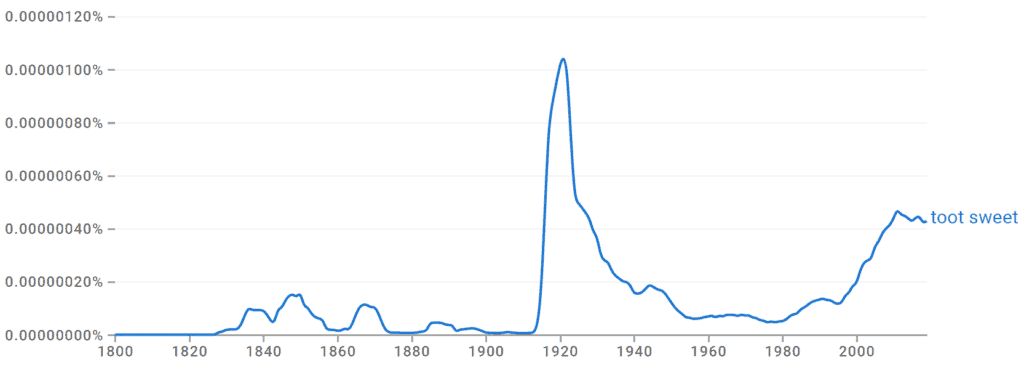The English language is full of foreign word and expression adaptations. Whether originating from a long line of etymological changes or due to slang uses of exposure, these words and terms can create confusion for anyone unaware of their meaning.
Toot sweet is an example of this, providing an expression to mean “right away” adapted from a phonetic pronunciation of the French term tout de suite. Once widely used, the term has been popular throughout the last century. However, it is not as popular now as it once was.
Let’s look at its meaning and origins so you can recognize its interesting history and use it in your speech and writing.
What Is the Meaning of Toot Sweet?
Toot sweet is an anglicized pronunciation of the French phrase tout de suite, which means immediately or right away. Due to the French pronunciation that removes almost all emphasis on the “de,” English speakers hear something that sounds similar to “toot sweet,” first documented in the mid-19th century.
The English spelling and pronunciation are used the same in writing as if you were using the proper French spelling.
For example:
- If you don’t want to miss the bus again, you’d better leave toot sweet!
- Get moving, toot sweet, and we’ll be back in a half hour to see how far you’ve gotten on that proposal.
- You’d better get down to the office toot sweet; the staff is in an uproar over the changes in hourly rates.
Origins of Toot Sweet
The first documented use of toot sweet occurred in 1848 in Sharpe’s London Magazine. It was likely a term used before this. But in print, it pointed out the poor use of “distorted speech” in adapting the speech of his “French Neighbors.”
- In the days of stage coaches we heard in the coffee-room of an inn much frequented by those creeping vehicles, a good stout representative of our insular greatness shout “Garsong!” and a clumsy, greasy waiter respond “Toot sweet, Mounseer!”
The use of toot sweet didn’t truly gain ground in the English language until World War I when English-speaking soldiers adapted French words into their vocabulary in an attempt to communicate with locals on the Western Front.
Documentation of this popped up in various war journals and reports, such as Tommy Atkins calling “toot sweet” after two boys he had paid off to carry a message as recorded in the Sunday Pictorial on the 25th of April, 1915.
Its use became fairly popular through the first half of the 20th century, with other variations occurring, such as tooter the sweeter—meaning the sooner,r the better. This line was first recorded in a cartoon published in Punch (the London Charivari) in December 1917.
Few American soldiers could speak French, but it was only natural that key phrases would be learned, considering the close proximity to an army speaking a foreign language. The Americans brought the term home with them in the slang form, toot sweet.
Some consider toot sweet a mockery of the French. However, it is just as logical to assume it was a phrase that the Americans found useful, though they only knew it from verbal exposure and were unaware of how to spell it. Today, most English speakers who use the term toot sweet are unaware of its origins.
Let’s Review
Toot sweet is the English pronunciation of the French phrase tout de suite, which means hurry up immediately or right away. Although used in the mid-19th century, it didn’t become popular until allied forces occupied France during World War I, prompting many soldiers to embrace certain expressions to better communicate with locals.
Enjoyed reading about this idiom? Check out some others we covered:


